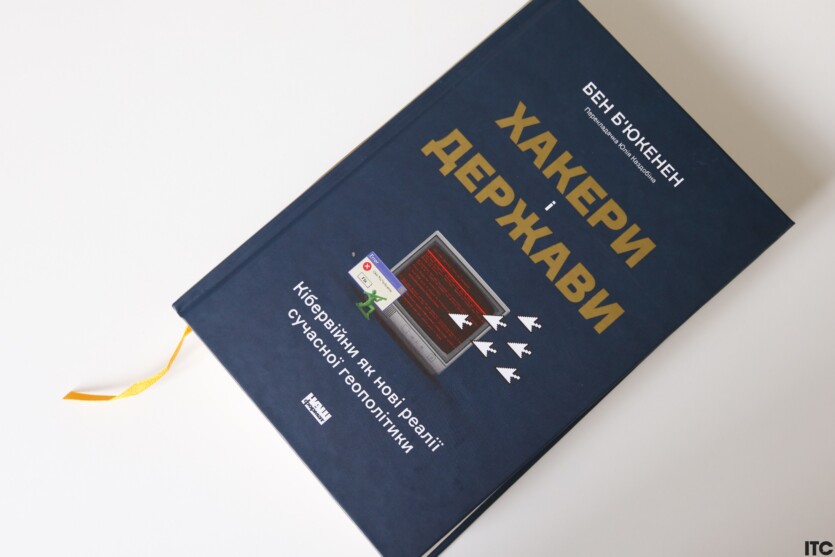
When cyberattacks appear in the news, they usually appear as isolated incidents — a bit sensationalized and often too far away. A data leak here, a hacked server there, but behind every such story is something more serious. However, this is mostly known only to us, Ukrainians, due to systematic cyberattacks by Russians over the years. But not the whole world. In his book «The Hacker and the State», Ben Buchanan shows how countries are turning digital attacks into a part of a larger political game and an essential element of pressure. It’s no longer about individual hackers in basements, it’s about entire departments and intelligence services operating on the shadowy border between war and diplomacy.
«The Hacker and the State: Cyber Attacks and the New Normal of Geopolitics»
Author Ben Buchanan
Translator Yulia Kazdobina
Publisher «Our Format»
Language Ukrainian
Number of pages 352
Cover Solid
Year of publication 2024
Size 140×210 mm
Website nashformat.ua
«The Hacker and the State: Cyber Attacks and the New Normal of Geopolitics» offers a deep dive into one of the least transparent but increasingly influential fronts of modern geopolitics — cyberspace. Its author has a background in academia, politics, and analytics, and has worked in the White House. He presents complex topics in such a way that even without technical training, the reader can get involved in this labyrinth of digital conflicts, espionage, and shadow attacks. Of course, if you are interested in this topic. Probably, this is not the case when a book can interest people outside the topic.
Instead of a dry list of attacks or technical characteristics, the author emphasizes the relationship between cyberattacks and real state interests, political decisions, and strategies of global players. He shows the hacker not just as a basement intruder, but as a tool in the hands of Beijing, Moscow, or Washington. And it seems that these tools are becoming more accurate and dangerous.
The book is not just a collection of facts, but a map of the modern world, where geopolitics has long gone beyond real borders and moved into the digital space where serious battles are taking place.
One of the book’s greatest strengths is its clarity and structure. Buchanan organizes a complex and often opaque subject into a series of compelling case studies, including cyber incidents involving the United States, China, russia, Iran, and North Korea.
By examining events such as the Stuxnet attack on Iran’s nuclear program, russian operations against Ukraine, and China’s long-term cyber espionage campaigns, the author paints a vivid picture of how the latest cyber tools are shaping contemporary international relations.
At the same time, the author does not fall into conspiracy theories. He carefully weighs each of his assumptions, explaining why we can (or cannot) be sure that a particular state is behind a particular attack.
Buchanan emphasizes that the traditional notion of deterrence, as it worked in the nuclear age, does not work in cyberspace. The technical anonymity, relative ease of attack, and lack of direct physical consequences make cyberwarfare and all types of similar operations particularly insidious. In such a world, the rules have not yet been created, and the most skillful players have time to act before they are caught. And even if it is known who they are, it is almost impossible to get to them because hackers are protected by the government they work for.
Ben Buchanan provides an interesting insight into the world of state-sponsored cyberattacks and how they are linked to their geopolitical goals.
Despite the complexity of the topic, the author maintains a good balance between depth and accessibility. The text is easy to read without losing its seriousness. It is also important that the author does not idealize either side. Even the United States, which in many Western texts looks like a victim of cybercrime, is presented here as a player with its own long history of offensive actions. The Stuxnet virus, for example, was a joint development of the United States and Israel. The author does not embellish this story: he shows that by launching offensive actions, even with good intentions, countries set a dangerous chain of precedents.


Of course, this book is definitely not for everyone, because no matter how well Buchanan writes, no matter how interestingly he operates with facts, guesses, and assumptions, his chosen topic will interest relatively few readers. And this is despite its extreme importance in the modern world.
Because the book is extremely relevant and timely, especially for Ukrainian readers. In the context of the war with Russia, where the front exists not only in physical space but also in information and cyberspace, «The Hacker and the State» provides the reader with a basis for understanding — how this invisible weapon works. At the same time, this is not a classic investigative journalism, but rather an intellectual map of digital geopolitics: with players, strategies, traps, and risk zones.



As always, I have no questions about the publication by «Our Format». I like their books, the topics they choose, and the pictures they use for their publications. They are bright and thematic at the same time, simple and yet able to attract attention. I like the font and the paper, although I would like to see the former a bit larger. And there’s also a lasso.



Spelling error report
The following text will be sent to our editors: